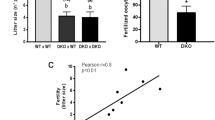Abstract
Background: Sperm encounter with various secreted proteins in epididymis resulted in gaining their motility and rearrangement of lipid/protein on the plasma membrane. A family of proteins named Binder of SPerm (BSP) expresses exclusively in male mammalian reproductive tract. Despite differences in the number of forms and concentration, they share analogs function and conserved structure in all the mammals. Studies have indicated an ambivalent function for these proteins in male reproductive tract by interacting with choline phospholipids (PC) on sperm membrane resulting in gaining motility and preventing premature capacitation. However, in the female genital tract, BPS proteins promote capacitation by interacting with components present in this environment. Recently, two homolog epididymal BSP proteins were identified in mouse (Bsph1 and Bsph2) and one in humans (BSPH1). In order to characterize and establish the role of these proteins in fertility knockout mice were produced and the fertility ability was assessed.
Access provided by Autonomous University of Puebla. Download conference paper PDF
Similar content being viewed by others
Background: Sperm encounter with various secreted proteins in epididymis resulted in gaining their motility and rearrangement of lipid/protein on the plasma membrane. A family of proteins named Binder of SPerm (BSP) expresses exclusively in male mammalian reproductive tract. Despite differences in the number of forms and concentration, they share analogs function and conserved structure in all the mammals. Studies have indicated an ambivalent function for these proteins in male reproductive tract by interacting with choline phospholipids (PC) on sperm membrane resulting in gaining motility and preventing premature capacitation. However, in the female genital tract, BPS proteins promote capacitation by interacting with components present in this environment. Recently, two homolog epididymal BSP proteins were identified in mouse (Bsph1 and Bsph2) and one in humans (BSPH1). In order to characterize and establish the role of these proteins in fertility knockout mice were produced and the fertility ability was assessed.
Main Question: What is the effect of lacking the Binder of SPerm proteins (BSPs) on male fertility?
Experimental Design: In order to define the role of BSP proteins in epididymis, the Clustered Regularly Interspaced Short Palindromic Repeats (CRISPR)/CRISPR-associated 9 (Cas9) was utilized to produce Bsph1 and Bsph2 knockout mice. The double knockouts were confirmed at mRNA (RT-PCR and qPCR) and protein (Mass spectrometry) level. The double knockout models were evaluated for animal fertility and several sperm parameters. Trio mating was performed to assess the fertility capability of the double knockout.
Main Results: Male mice without BSP proteins showed normal fertility, with no differences in litter size, motility, and sperm count compared to wild type. BSP null mice mated naturally and were healthy. Taken together, these data indicate that BSP proteins are not essential itself for sperm maturation and fertilization, at least in the mouse.
Conclusions: It seems that the absence of BSP protein does not have an important effect on male infertility.
Author information
Authors and Affiliations
Editor information
Editors and Affiliations
Rights and permissions
Copyright information
© 2021 Springer Nature Switzerland AG
About this paper
Cite this paper
Eskandari, M. (2021). Absence of BSP do not Have an Important Effect on Male Fertility. In: Björndahl, L., Flanagan, J., Holmberg, R., Kvist, U. (eds) XIIIth International Symposium on Spermatology. Springer, Cham. https://doi.org/10.1007/978-3-030-66292-9_51
Download citation
DOI: https://doi.org/10.1007/978-3-030-66292-9_51
Published:
Publisher Name: Springer, Cham
Print ISBN: 978-3-030-66291-2
Online ISBN: 978-3-030-66292-9
eBook Packages: Biomedical and Life SciencesBiomedical and Life Sciences (R0)




